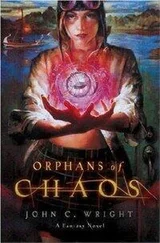It was all over in less than an hour. The whole community stood on the deck of the barge, beneath the crystalline pavilion roofs, glowering at Phaethon. The black pool at his feet trembled as it went through its self-cleaning routine, restoring broken memory chains and command lines. About one-fourth of the material had been consumed; the memory storage in the rest had sufficient mass to recompile the missing parts. The damage was curable.
Phaethon, his heart large with emotion, placed his foot into the pool. The suit lining recognized his cell structure. Like a loyal hound after a long absence, it remembered him. There was an upward rush of motion. The lining flowed over his body and established connections to his skin, nerves, and muscles. The golden plates slid upward and clattered into their proper places. A sense of wonderful well-being suffused him.
Ironjoy made a signal to his people. "And now, trespasser, you are no longer welcome here. Don't show your face again!"
And, with a rush, the people crowded forward and threw Phaethon into the sea. The constables did not interfere. Phaethon plummeted, splashed, and sank like a stone. But, beneath his helmet, he was smiling.
As he sank, Phaethon's smile faded, and he began to realize the enormity of his error.
Above, the barge was a square shadow, surrounded by ripples of agitated light. To every side were lesser shadows, spider shapes of the dead houses seen from below, their splayed float pods tangled with trailing vines and nets and lines of kelp.
He had erred. Intent on his armor, he had forgotten his life.
For what was he to do now?
The inescapable obstacle to any attempt by Phaethon to build up another fortune, buy passage to Mercury, call his ship, or organize a protest against the Hortators' decision was, simply and absolutely, that he dared not log on to the mentality. The enemy virus lurking in the mentality, waiting for Phaethon, closed all Phaethon's options.
Ironically, if he had gone to a simple thought-shop before his exile, and bought a script board, or some other indirect means of communicating with the mentality-even through a cheap pair of gloves as he had seen some of the wretched Ashores of Talaimannar use-he might have been able to find ways to send messages to, and perform useful work for, some of Ironjoy's dark markets; markets which the Hortators apparently could not close off.
Worse, there were obviously such devices for sale from Ironjoy. Had Phaethon not gotten himself exiled from the exiles, he might have been able to begin a long, slow, painful process of rebuilding his life, of reaching his ship.
Now, there was not even that.
Down he sank.
The bottom of the bay fell in a series of shelves into the deeper seabeds beyond. Bioformations that formed the nervous system of Old-Woman-of-the-Sea were mingled among the nets and beds of kelp and seaweed lining the muck and silt underfoot. Phaethon spied a place where the kelp had been crushed aside, as if by the rolling of a massive cylinder. Curious (and unwilling to return, just as yet, to the surface) Phaethon followed the trail of destruction.
He pondered as he slogged through the floating clouds of mud. Occasionally he stumbled. He had been without proper sleep for so long that his makeshifts were not able to catch and repair all the damage it was doing to his nervous system. A check on his internal systems showed another disaster looming. If he used his reduced supply of nanomaterial to form a recycling environment, allowing him to stay down here, there might not be enough to form the neuretic tissues he needed to reconstruct the crude self-consideration circuit he was using to stave off sleep deprivation. Also, some of the memories directly relating to past dream states, associational chains, and proper mental balance had been lost. He might not have time to reconstruct that information.
He was reluctant to rise to the surface, however. He suspected the behavior of the constables just now. Why had they been so very slow to interfere when Phaethon had been robbed? Or when Phaethon and Ironjoy had wrestled over the helmet? Phaethon recalled the Hortators' promise that Nebu-chednezzar Sophotech could see to it that Phaethon would not stand any chance of finding food or help. Could this whole scene have been arranged? Had both Ironjoy and Phaethon been tricked, manipulated, out-guessed?
Perhaps it had been foolish even to dream that the Hortators' Sophotech would not deduce Phaethon's flight to Talaimannar. The cyborg calling itself the Bellipotent Composition might not have had as secure a privacy as it had said. The cyborg could have been deluded, dream-caught, simply a memory addict who thought it was Bellipotent, thought it had privacy rights.
Besides, there were ways of tracking air movements Phaethon could think of; signals bounced from the underside of the ring-city, for example. If Phaethon could think of one, trust that a Sophotech could think of a thousand.
Had Nebuchednezzer Sophotech been able somehow to influence the constables to produce a crisis between Ironjoy and Phaethon? Anyone wishing to destroy Phaethon would rejoice at Ironjoy's enmity with him. In Ironjoy's shop, Phaethon might have been able to buy a self-consideration circuit to enable himself to program his sleep-and-dream cycles to repair, annex, balance, and regenerate the tired nerve paths in his artificial brain tissue in the same way that natural dreaming restored natural tissue. Had he and Ironjoy cooperated, it would have saved him from going mad.
Within the limits of the law, there was some scope, some gray areas, some flexibility of interpretation, as to how the constables could do their jobs. If so, it was safe to assume they would use that flexibility to do Phaethon as much harm as they could without actually overstepping the strict boundary of what was permissible. If so, it was better not to return to the surface, where the constables swarmed.
And Phaethon saw none down here.
His sleep deprivation, no doubt, was what had allowed his anger to escape him during his confrontation with Ironjoy. It was affecting more and more of his memory; he was suffering spasms of fatigue, dizziness, light-headedness. Eventually, he would die of this.
Without a self-consideration circuit to help organize his complex brain levels, the neural degeneration would proceed at an ever-increasing rate.
There was nothing to do, but to lie down and wait to go mad and die.
Strange. That a lack of a dream could kill a man.
Or maybe it was not so strange.
The line of wreckage dropped off the edge of a long slope. Here were grooves in the mud where some great weight had passed, discoloration where coral had been scarred. Phaethon began to pick his way down the slope, deeper into the green gloom.
Phaethon was more fatigued than he suspected. Farther and farther down the subsea slope he wandered, having long since lost the trail of debris he followed, and, in his daze, having forgotten what whim or purpose brought him here.
It grew darker; he was very deep; and clouds of slow mud, like wings, billowed from his every shuffling step.
He was jarred awake by an ache in his chest. It was a pain signal from a special organ he had had implanted in his lung. The organ was one of the earliest modifications of space-biotechnology, dating back to the first Orbital City, and allowed the user to detect a loss in oxygen levels (something the nose of an unmodified man was not able to detect), and warned of hypnoxia, hyperventilation, or anoxia.
He was choking to death without noticing it.
Phaethon blearily activated his internal thoughtspace and demanded a report from his suit. Headache pains stabbed him as the system came on; the icons seemed to drift and slide and blur in his vision.
The report jumped and swam jerkily into his thoughts.
Читать дальше











